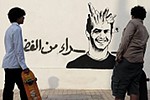 Shadows off the beaten path
Shadows off the beaten pathINVOLUNTARY | MICROPHONE
< < F O R E I G N > >
last update 25.Oct.10
See also: SHADOWS FILM FESTIVAL
 R E V I E W B Y R I C H C L I N E
R E V I E W B Y R I C H C L I N E
scr Alejandro Fadel, Martin Mauregui, Santiago Mitre, Pablo Trapero
with Ricardo Darin, Martina Gusman, Carlos Weber, Jose Luis Arias, Fabio Ronzano, Loren Acuna, Gabriel Almiron, Jose Espeche

release Arg 6.May.10,
UK Oct.10 lff
10/Argentina 1h47
CANNES FILM FEST TORONTO FILM FEST

 Bold and muscular filmmaking lifts this noir-style thriller above the murky nastiness of its storyline. And even though everyone's a little too morally compromised, the cast and crew give us plenty to chew on.
Bold and muscular filmmaking lifts this noir-style thriller above the murky nastiness of its storyline. And even though everyone's a little too morally compromised, the cast and crew give us plenty to chew on.
Ambulance-chasing lawyer Sosa (Darin) is desperate to stop working for a shady legal firm that's part of a conspiracy called The Foundation. This includes cops, doctors and judges who rake in as much cash as they can from insurance claims while paying the victims as little as possible. One night Sosa meets a doctor, Lujan (Gusman), who isn't part of all of this; he not only falls for her, but sees her as a way out. If only he can keep from entangling her in his messy life. Fat chance.
Filmmaker Trapero captures this story with rich colours, deep shadows and intriguing perspectives. Reflections figure heavily in the visual style of the film, which of course echoes the moral maze these characters have entered. Although it's not easy to sympathise with people who so willingly bend the rules and risk their necks, we can see that they are at least trying to do the right thing in the bigger picture. And that the whole system is rotten to the core.
Darin and Gusman make a strong couple; even though they seem like an odd mix, there's a believable warmth to their interaction that's extremely refreshing in a film that's otherwise so dark and often brutally violent. Sometimes it feels like their story is playing out like a twisted romantic comedy, as events push them together and then pull them apart. And the thugs that are lined up to beat Sosa every time he turns around are genuinely scary because they're mainly lawyers and cops.
In the end, the film is perhaps a bit too grim to really grow on us, probably because there isn't much to it beyond the bleak portrayal of Argentine society. The personal story at the centre is the most involving thing about the movie, and it almost gets lost in the carefully plotted series of events. But it's expertly assembled in such a way that it really sends chills up our spines. And the final sequence is genuinely shocking, uncompromising cinema.
24.Oct.10 lff
 R E V I E W B Y R I C H C L I N E
R E V I E W B Y R I C H C L I N E Les Amours Imaginaires [aka: Love, Imagined]
Les Amours Imaginaires [aka: Love, Imagined]
prd Xavier Dolan, Carole Mondello, Daniel Morin
with Monia Chokri, Xavier Dolan, Niels Schneider, Anne Dorval, Anne-Elisabeth Bosse, Megalie Lepine-Blondeau, Olivier Morin, Eric Bruneau, Gabriel Lessard, Benedicte Decary, Patricia Tulasne, Louis Garrel

release US 25.Feb.11
UK 27.May.11
10/Canada 1h37
CANNES FILM FEST
TORONTO FILM FEST


 At 21, actor-filmmaker Dolan proves that I Killed My Mother was no fluke. This is even bolder filmmaking that continually takes risks with its material. It's not always successful, but it's clever, funny and sharply observant.
At 21, actor-filmmaker Dolan proves that I Killed My Mother was no fluke. This is even bolder filmmaking that continually takes risks with its material. It's not always successful, but it's clever, funny and sharply observant.
Marie and Francis (Chokri and Dolan) are best friends who both fall for the same guy, the dreamy Nicolas (Schneider) with his golden locks and youthful mystery. Everything he says and does seems like a come-on to both Marie and Francis, who continually wonder whether he's gay or straight, but never ask him. This leads to a growing sense of competition and disappointment between them, straining their friendship to the breaking point. And Nicolas seems utterly oblivious to it all.
As writer and director, Dolan takes a playful approach that often feels reminiscent of Almodovar, worshipping both stylish women and beautiful men with languid camera movement, abrupt music and vivid colour. And scenes unfold in diptych echoes that are eerily effective. Meanwhile, the plot brings to mind Bertolucci's The Dreamers (yes, that's Louis Garrel in a late-film cameo).
But Dolan has some originality as well, most notably in the four stylised sex scenes. He seems to be avoiding both naturalism and explicitness in lieu of something more introspective, so they're intriguingly cerebral rather than sensual. It's a mannered touch that hints at pretension while teetering on the brink of looking ridiculous. But he gets away with it because of microscopic attention to character detail.
In the cast, Chokri is especially strong, capturing tiny mood shifts as scenes play out in ways Marie doesn't want them to. Her interaction with both Schneider and Dolan is incredibly honest, and both young men bring an earthy interior quality to their roles. Dolan plays Francis as a pretty boy with no self-confidence at all, while Schneider gives Nicolas an external ignorance that covers something frighteningly knowing.
In the end, this is a story about how we let ourselves down because our expectations fog our ability to make good decisions. The real world is a nastier place than the idealised romance in our heads. And Dolan seems to be saying that this is just the way it is, so we'd better learn to enjoy ourselves between the moments of agonising pain.
4.Oct.10 lff
 R E V I E W B Y R I C H C L I N E
R E V I E W B Y R I C H C L I N E De Ofrivilliga
De Ofrivilliga
prd Erik Hemmendorff
scr Erik Hemmendorff, Ruben Ostlund
with Cecilia Milocco, Villmar Bjorkman, Linnea Cart-Lamy, Sara Eriksson, Olle Liljas, Leif Edlund, Henrik Vikman, Maria Lundqvist, Ulf Lundstedt, Ida Linnertorp, Lola Ewerlund, Vera Vitali
 release Swe 28.Nov.08,
release Swe 28.Nov.08, US May.09 siff, UK 8.Oct.10
08/Sweden 1h38
CANNES FILM FEST
 Five unconnected stories are shot and intercut to draw out common thematic threads in this clever, artistic exploration of peer pressure. It feels a little random and scattershot, but watching it is a deeply haunting experience.
Five unconnected stories are shot and intercut to draw out common thematic threads in this clever, artistic exploration of peer pressure. It feels a little random and scattershot, but watching it is a deeply haunting experience.
It's late-spring in Sweden and passions are running high. Villmar (Bjorkman) has a fireworks show after dinner without taking the best safety precautions. Teens Linnea and Sara (Cart-Lamy and Eriksson) party with their friends, even though they have no tolerance for alcohol. On a weekend away with old pals, Olle and Leif (Liljas and Edlund) find that things go a little too far. Cecilia (Milocco) wonders what to do when she sees a fellow teacher (Lundstedt) hit a student. And bus driver Henrik (Vikman) refuses to go any further until someone confesses to vandalism.
In each of these cases, the group mentality has a major effect on the moral repercussions. Sometimes this is positive or even curative, but other scenes involve ostracism and physical danger. Thankfully, the filmmakers resist the temptation to preach at us, instead just showing is the events and letting us draw any conclusions there might be. And while this is a bit cool, it's also deeply challenging.
The filmmaking style echoes this objective approach, as scenes are photographed in static, long takes that refuse to let us see everyone or everything involved. Key elements are obscured by distance, lighting or simply due to people facing the wrong way, which forces us to internalise the dialog and sometimes to imagine that we see what's happening. The performances take a similar slant, as the cast members bounce off each other with realistic awkwardness, including scenes that are pointed, tender and funny.
Along the way, tiny dramas emerge on every side, and we are forced to actively participate in each person's internal struggle. Yes, this is a "what would you do?" sort of movie, and its aloof style makes it feel overlong and rather unsettling. But it vividly depicts how each moral decision carries a consequence. Finding the strength to stand up for what's right isn't always easy. And it doesn't always make things better.
5.Aug.10
 R E V I E W B Y R I C H C L I N E
R E V I E W B Y R I C H C L I N E
prd Khaled Abol Naga, Mohamed Hefzy
with Khaled Abol Naga, Menna Shalabi, Hany Adel, Ahmad Magdy, Yousra El Lozy, Shaheen, Omar Boflot, Salwa Mohamed, Nagy Nabil, Atef Yousef

release UK Oct.10 lff
10/Egypt 2h00
TORONTO FILM FEST

 Lively and brimming with youthful talent, this Egyptian drama vividly captures the energy of a group of underground artists in Alexandria. The film is a bit long and undisciplined, but it's also well worth seeing.
Lively and brimming with youthful talent, this Egyptian drama vividly captures the energy of a group of underground artists in Alexandria. The film is a bit long and undisciplined, but it's also well worth seeing.
Khaled (Naga) has returned home after seven years and is trying to rekindle things with his old girlfriend Hadeer (Shalabi), but she has just decided to move to England. Meanwhile, Khaled and his colleague Hany (Adel) are looking for young bands to sign for a record deal, while film students Ahmad and Salma (Magdy and El Lozy) are making a documentary about the underground scene, shooting interviews with musicians and trying to keep up with their secret concert schedules. And everyone's working to get a big concert off the ground, despite various financial and political obstacles.
The film is shot in a loose style that cleverly echoes the characters' off-the-cuff lifestyle, catching small details in the people and situations as well as the bigger picture. These are artists who skilfully create gorgeous music and images that are also extremely pointed. And filmmaker Abdalla captures this with excellent photography, sound and editing, although perhaps a more determined editorial approach would have helped shape the narrative more clearly.
As is, there are so many characters that it's not easy to keep track of what's happening. Everyone is engaging to watch, and their various situations are fascinating, but we can never actually get involved in the film simply because there's no central through-line to grab hold of us. This is true even in the final section, during which a series of events strains to create a sense of tension.
What we're left with is an astute look at life in Alexandria unlike anything we've ever seen on film. The multi-generational approach is extremely effective, as we see has-been artists, veteran fast-talkers, ambitious businessmen and talent scouts, plus young musicians and graffiti artists who are hungry to break out of their small circle of friends to a wider audience. That the society is so set against them is actually rather tragic, although the filmmakers continually hint that these resilient, determined young people will keep bouncing back.
15.Oct.10 lff


See also: SHADOWS FILM FESTIVAL
© 2010 by Rich Cline, Shadows
on the Wall